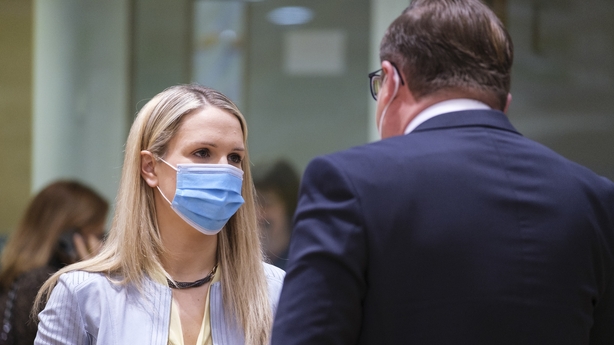The Government is looking at the possibility of accommodating Ukrainian refugees in modular homes on State lands, RTÉ News understands.
However, the focus will initially turn to providing accommodation in hotels for those arriving here from Ukraine.
This was among the items discussed at a meeting of Ministers this afternoon which examined the situation in Ukraine and the potential implications for Ireland.
The meeting was also due to consider if more sanctions on Russia might be necessary to offer further support to Ukraine.
There was also due to be a discussion on possible financial supports for businesses and households to help them deal with this latest economic shock.
The meeting was chaired by the Taoiseach and attended by the Tánaiste, Minister Eamon Ryan, the Minister for Justice, the Minister for Finance, the Minister for Public Expenditure and Reform, the Minister for Foreign Affairs, the Minister for Children, Equality, Disability, Integration & Youth and the Minister for Education.
The meeting agreed that departments and agencies will work together to prepare for the possibility of significant numbers being offered protection in Ireland.
This figure could be in excess of 20,000 people.
Arrangements will also be put in place to coordinate offers of practical assistance from communities across the country. This is expected to include offers of accommodation in people's homes.
The meeting heard too that energy costs are likely to be impacted and the Government is working with the European Commission and Member States on a coordinated response.
There will now be weekly meetings of Secretaries General of Government departments to monitor developments and to provide weekly reports to Government.
Govt concerned over rising energy costs - Varadkar
We need your consent to load this rte-player contentWe use rte-player to manage extra content that can set cookies on your device and collect data about your activity. Please review their details and accept them to load the content.Manage Preferences
The Government will look at reducing excise duties on fuel and energy supplies, the Tánaiste has indicated in the Dáil.
Speaking during Leaders' Questions in the Dáil, Mr Varadkar said there is concern in Government about increasing energy costs, which he predicted would rise further in the coming weeks.
This is as a result of the Russian president upending hopes of a period of normality and stability in the aftermath of the pandemic, he said.
However, Mr Varadkar sought to reassure the House that Ireland's energy supplies are secure and do not depend on Russia or Ukraine.
Sinn Féin TD Rose Conway-Walsh had earlier told the Dáil that the price of oil and gas is on the rise again.
The Mayo TD said this is having a particularly harsh impact in rural areas where more homes are heated by oil and there are fewer public transport options.
Reacting to the Tánaiste's comments about reducing excise duty on fuel, a spokesperson for the Green party told RTÉ News the party leaders "are discussing lots of things at the moment relating to Ukraine and we don't want to pre-empt those discussions".
The Taoiseach has said the implications of what is occurring in Ukraine will be with us for some time.
Speaking at the launch of Census 2022, Micheál Martin said issues around accommodation, economy and the impact on energy will be significant and everything needs to be looked at as a wartime effort, including around food provision.
He said the barbaric, indiscriminate nature of the Russian invasion of Ukraine requires a humanitarian response.
Mr Martin acknowledged that the number of people arriving in Ireland from Ukraine will be very high, but a step-by-step approach is required.
Read more on the invasion of Ukraine
Last night, Mr Martin told the Fianna Fáil parliamentary party meeting that a major humanitarian crisis will arise in the coming period, which will be met by a humanitarian response from the Irish Government and from communities across the country.
The parameters of this response will be fleshed out at a meeting of EU Justice and Home Affairs Ministers in Brussels.
The EU-wide directive under discussion would standardise the provision of temporary protection across EU member states.

Minister for Justice Helen McEntee is one of a number of ministers pushing to activate the Temporary Protection Directive.
Separately, Minister for Foreign Affairs Simon Coveney is to address the United Nation's Human Rights Council in Geneva.
The Department of Foreign Affairs has said the minister will "call for an immediate ceasefire, the unconditional withdrawal of Russian forces, and the holding to account of all perpetrators of violations and abuses of human rights in Ukraine".
Additional reporting Ailbhe Conneely, Joe Mag Raollaigh







